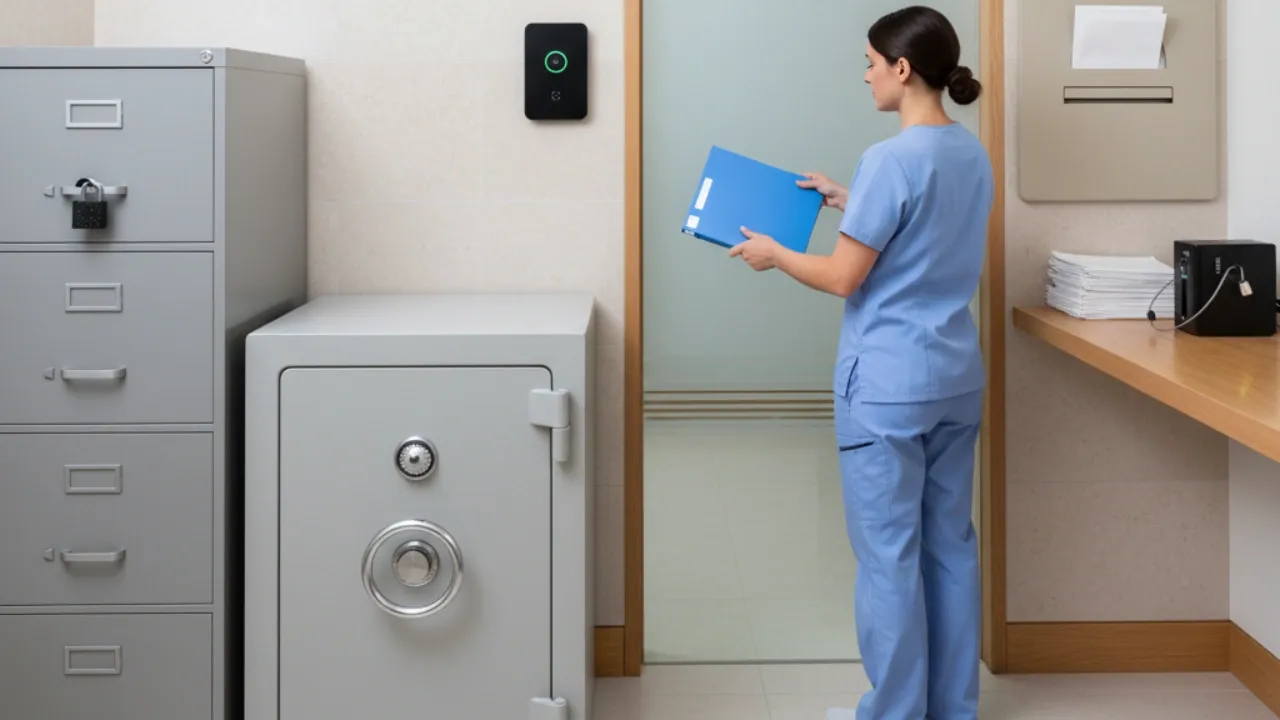
Information security has never been more critical in healthcare. With ongoing digitization and the volume of sensitive data growing, medical clinics carry a greater responsibility than ever: protecting patients’ information. In the United States, that responsibility isn’t just a best practice—it’s a legal requirement under the Health Insurance Portability and Accountability Act (HIPAA) and related rules.
Yet many clinics still have questions about how HIPAA works in practice, the main risks to watch, and how to adjust internal processes to stay compliant. The good news: you can adapt gradually and systematically with planning, awareness, and the right tools. This article explains HIPAA in medical clinics—how it works and how to get compliant.
Before we continue, we need to ask: Are you already familiar with Ninsaúde Clinic? Ninsaúde Clinic is a medical software with an agile and complete schedule, electronic medical records with legal validity, teleconsultation, financial control and much more. Schedule a demonstration or try Ninsaúde Clinic right now!

What HIPAA Is—and Why It Applies to Clinics
HIPAA (and the HITECH Act) governs how protected health information (PHI) is used, disclosed, stored, and secured by covered entities (e.g., most medical clinics, physicians) and their business associates (vendors that handle PHI on your behalf). The goal is to protect privacy rights and the confidentiality, integrity, and availability of PHI.
In healthcare, the bar is higher because clinics routinely process sensitive PHI, including:
- Medical histories and diagnoses
- Test and imaging results
- Genetic/biometric data
- Treatment plans and medications
- Insurance and payer information
Because clinics handle highly confidential information, they must ensure not only confidentiality but also ethical, transparent, and secure handling of that information throughout its lifecycle.

Core HIPAA Principles Clinics Should Operationalize
HIPAA’s Privacy Rule and Security Rule translate into day-to-day practices. Key concepts include:
- Permitted uses & disclosures: PHI can be used and shared for treatment, payment, and healthcare operations (TPO) without patient authorization.
- Minimum necessary: use/disclose only the PHI reasonably needed for the task.
- Transparency: patients receive a Notice of Privacy Practices (NPP) explaining how their PHI is used and their rights.
- Security safeguards: implement administrative, physical, and technical safeguards to protect ePHI.
- Risk analysis & management: perform an enterprise risk analysis and mitigate identified risks on a continuing basis.
- Workforce training & policies: train staff and enforce written policies and procedures.
These principles should be embedded across the clinic journey—from scheduling and intake to documentation, billing, and archival.
Authorization vs. Consent: What Your Clinic Needs to Know
Clinics often think they must get consent for everything. Under HIPAA:
- No authorization is required for TPO activities (treatment, payment, operations).
- Authorization is required for marketing uses of PHI, most research uses, and many non-TPO purposes.
- Patient rights include access, amendments, accounting of disclosures, and request for restrictions—processes you need to support.
In short, you can use PHI without authorization to deliver care, bill and collect, or run quality and compliance programs. But for secondary uses—like email campaigns or third-party marketing—obtain a valid HIPAA authorization first (separate from general consent to treat).
Also consider other U.S. laws that may apply: 42 CFR Part 2 (substance use disorder records), state privacy laws (e.g., CCPA/CPRA in California, Colorado Privacy Act), TCPA/CAN-SPAM for communications, and information blocking rules (ONC Cures Act) related to patient access.
Risks and Penalties for Non-Compliance
HIPAA violations can lead to serious consequences—financial and reputational. Potential outcomes include:
- Civil monetary penalties (tiered, per violation, with annual caps that can reach into the millions depending on willfulness and correction).
- Corrective action plans and audits by HHS Office for Civil Rights (OCR).
- Breach notification obligations to affected individuals, HHS OCR, and (when >500 individuals in a state/jurisdiction) to the media—generally without unreasonable delay and within 60 days of discovery.
- State AG actions and class actions under state law.
Beyond fines, data incidents erode patient trust—a critical asset in healthcare.

Practical Steps to Get (and Stay) Compliant
Compliance doesn’t have to be bureaucratic. Embed privacy and security into your operating model:
1) Data inventory & mapping
Identify what PHI you collect, how, where it lives, who can access it, and with whom it’s shared. This drives your risk analysis and safeguards.
2) Policies, NPP, and governance
Maintain an updated Notice of Privacy Practices; adopt Privacy/Security policies, sanction policies, incident response, retention/disposal, and vendor management procedures.
3) Workforce training
Train all staff on HIPAA basics, role-specific responsibilities, secure handling, and how to spot/report incidents (phishing, misdirected faxes/emails, tailgating).
4) Access controls & authentication
Use role-based access, strong passwords, MFA, automatic logoff, and unique user IDs. Review access regularly and promptly terminate when staff leave.
5) Technical safeguards
Encrypt ePHI in transit and at rest; maintain secure configurations, patching, endpoint protection, secure messaging, and audit logging. Segment networks and disable unnecessary services.
6) Physical safeguards
Secure server rooms, lock paper charts, control workstation placement, and manage device/media disposal (shredding, secure wipe).
7) Risk analysis & remediation plan
Document a formal risk assessment (at least annually and upon major changes). Track remediation actions with owners and deadlines.
8) Incident response & breach notification
Define triage, containment, forensics, harm analysis, Breach Risk Assessment, decisioning, notifications (patients, OCR, media if applicable), and post-incident improvements.
9) Vendor oversight (Business Associates)
Execute Business Associate Agreements (BAAs) with third parties that handle PHI (billing, cloud hosting, EHR add-ons). Assess their safeguards and monitor performance.
How Ninsaúde Clinic Can Support Your Compliance Program
A capable EHR/practice-management platform can help operationalize safeguards. Ninsaúde Clinic supports clinics with:
- Encryption of stored data and secure transmission;
- Role-based access controls and per-user permissions;
- Audit logs for tracking access and changes;
- Electronic/digital signatures and secure document delivery;
- Secure messaging and e-prescriptions;
- Cloud hosting aligned with HIPAA best practices (plus options that support GDPR where relevant).
Important: No software by itself “makes you HIPAA compliant.” Compliance depends on how your clinic configures, uses, and governs the system—policies, training, BAAs, and ongoing risk management are essential.
Benefits of a Strong Privacy & Security Posture
Beyond avoiding penalties, a robust HIPAA program delivers clear advantages:
- Builds patient trust and differentiates your clinic as safe and professional;
- Reduces operational and legal risk;
- Streamlines processes and data governance;
- Facilitates partnerships with hospitals, payers, and referral networks;
- Supports business continuity and resilience.
Clinics that treat PHI with seriousness are better positioned competitively and demonstrate real responsibility toward patients’ health and privacy.

Privacy Isn’t an Obstacle—it’s a Path to Better Care
HIPAA compliance isn’t just a legal checkbox—it’s an opportunity to modernize workflows, strengthen security, earn patient trust, and stand out in a crowded market.
With platforms like Ninsaúde Clinic, which incorporate privacy-by-design features and security controls, the path to compliance becomes more practical, safe, and efficient. Most importantly, act responsibly, foster a privacy-first culture, and put the patient at the center—not only as a recipient of care but as the owner of their data rights.
In a sector where ethics, trust, and confidentiality are essential, protecting health data is more than an obligation—it’s a core value that underpins excellence in care.
Liked the information? Then prepare for a continuous journey of knowledge by following our blog. Are you a health professional and not yet familiar with the benefits of Ninsaúde Clinic? Stay ahead, optimize your processes, and elevate excellence in patient care!
